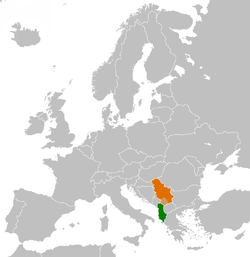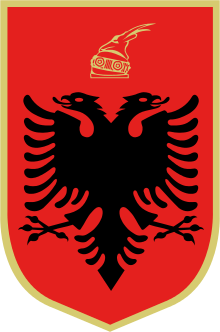Albania–Serbia relations
 |
|
Albania |
Serbia |
|---|---|

Albanian–Serbian relations are foreign relations between Albania and Serbia. Albania has an embassy in Belgrade.[1] Serbia has an embassy in Tirana.[2] Both countries are full members of the Council of Europe, the Organization for Security and Co-operation in Europe (OSCE), the Central European Free Trade Agreement (CEFTA) and the Organization of the Black Sea Economic Cooperation (BSEC). Serbia and Albania are both official candidate countries for EU accession.
History
Ottoman period
In the late Ottoman period, Serbian diplomat Ilija Garašanin contacted the abbot of Mirdita, Msgr. Gasper Krasniqi, with the goal of acquiring the Albanian Catholic element as the alleged solution to the "Eastern Question".[3] However, their goals were different. While Garašanin considered those contacts as means for the realization of a Serbian exit to the Adriatic Sea, Krasniqi made effort to help Serbia to organize a revolution of the Albanian Catholic community, primarily Mirdita, against the Turks, for the political freedom and independence of Albania.[3]
Balkan Wars
At the beginning of Balkan Wars, one of the important strategic goals of Serbian politics was to acquire a corridor to the Adriatic Sea, as such, its intention had been to share a common border with its ally the Kingdom of Greece thus denying the Albanian nation independent status.[4][5] The First Balkan War found the Albanians as a nation fighting for its own national state. This fighting was largely limited, however, to militia operations and guerrilla tactics.
World War II

During World War II, a very close cooperation developed between the People's Liberation Army of Yugoslavia and the People's Liberation Army of Albania. The Albanian People's Army assumed power in the country in 1944. Democratic Federal Yugoslavia was the first country to recognize the new government of Albania in April 1945.[6]
Cold War

There were communist plans to create a Balkan federation which would include Yugoslavia, Albania, Romania, Bulgaria and Greece.[6] However, after the resolution of Informbiro 1948, Albania broke relations with the Yugoslav communists, because Enver Hoxha remained loyal to the Soviet Union under Joseph Stalin.[6]
Yugoslav Wars
In June 1991, as the Yugoslav wars broke out, Albanian Foreign Minister Mehmet Kapllani visited Croatia. During this time, Ramiz Alia, President of Albania, began discussions with ethnic Albanian leaders in Kosovo. In July 1991 relations between Albania and Yugoslavia were strained. Yugoslav and Albanian leaders exchanged fire, and Serbian leaders accused Albanians of instigating unrest in Kosovo and not respecting frontier markers. The Yugoslav government released a statement accusing Albania of interfering in Yugoslavia’s internal affairs and warned Albania that Yugoslavia would react "decisively with all available means" to any challenges to its sovereignty.[7]
In a reversal of previous policies at the time, Albania improved relations with the Soviet Union and the United States to stop possible Serbian aggression and to stop the superpowers from exploiting unrest in Albania.[7]
In 1998, as Kosovo Albanian refugees were fleeing across the border into northern Albania, Albania had claimed that Yugoslavia had executed a campaign of ethnic cleansing, and called on the international community to intercede.[8]
In 2008, after Kosovo proclaimed its independence, Albania was one of the first countries to recognize it. Serbia's reaction was that of recalling the Serbian ambassador for consultations in protest from any state recognising Kosovo.[9]
In March 2009, Vladimir Vukčević, Serbia’s war crimes prosecutor, asked Albania to reinvestigate claims that some of the Serbs who disappeared during the Kosovo conflict may have been killed for their organs in Albania.[10]
21st century
Albanian Prime Minister Edi Rama visited Serbia and met with Serbian Prime Minister Aleksandar Vucic on 10 November 2014 for the first meeting of its type between the two countries' leadership since the 1947 meeting of Albanian dictator Enver Hoxha with President of Yugoslavia Josip Broz Tito. However, tempers flared when Rama said that Kosovo's independence was "undeniable" and "must be respected" and Vucic accused him of a "provocation".[11]
Minority rights
In December 2008 Serbian police arrested ten former members of the Kosovo Liberation Army (KLA), in an Albanian-populated area bordering Kosovo. Serbia's war crimes prosecution office stated that it had evidence that the ten KLA members had killed 51 people and kidnapped 159 civilians in Kosovo between June and October 1999. In January 2009 Albanian President Bamir Topi demanded that Serbia respect the Albanian minority in southern Serbia.[12]
See also
- Foreign relations of Albania
- Foreign relations of Serbia
- Albania–Kosovo relations
- Kosovo–Serbia relations
- Kosovo Serbs
- Accession of Albania to the European Union
- Accession of Serbia to the European Union
References
- ↑ "Vandals damage Albanian embassy in Belgrade". BBC. March 29, 1999.
- ↑ "Serbian charge d'affaires prepares to quit Albania". BBC. February 20, 2008. Archived from the original on 2010-11-13.
- 1 2 Prof. dr. Zef Mirdita, ALBANIA IN THE LIGHT OF SERBIAN FOREIGN POLICY
- ↑ Dimitrije Bogdanović: Knjiga o Kosovu
- ↑ Aleksandar Bošković, Albanci kao metafora Archived November 21, 2008, at the Wayback Machine.
- 1 2 3 Milorad Komatina, Enver Hodža i jugoslovensko-albanski odnosi, Službeni list SRJ, Beograd 1995. godina
- 1 2 Keohane, Robert Owen; Joseph S. Nye; Stanley Hoffmann (1993). After the Cold War. pp. 369, 370. ISBN 978-0-674-00864-9.
- ↑ "World: Europe Albania accuses Serbia of ethnic cleansing". BBC. June 2, 1998. Archived from the original on 2010-11-13. Retrieved 2009-04-16.
- ↑ "Archived copy". Archived from the original on 2008-04-08. Retrieved 2008-04-08. The economic team for Kosovo and Metohija and the South of Serbia, 20 February 2008. Retrieved 2008-03-25.
- ↑ "Serbia asks Albania to probe organ trafficking". Associated Press. March 2, 2009. Archived from the original on 2010-11-13. Retrieved 2009-04-16.
- ↑ BBC. "Serbia-Albania row over Kosovo mars historic Rama visit".
- ↑ "Albania urges Serbia to respect minority rights". 8 January 2009. Archived from the original on 2010-11-13. Retrieved 2009-04-16.
External links
- "Embassy of Serbia in Tirana". Retrieved 2009-04-16.
- Chekrezi, C.A (September 18, 1920). "ALBANIA'S COMPLAINTS.; Continued Advance of Serbian Troops Is Charged.". The New York Times. Retrieved 2009-04-16.
- "Serbian legation in us makes public charges that Albanians plan to attack Serbia along the frontier". The New York Times index. 1920. p. 10. Retrieved 2009-04-16.
- "Chekrezi denies Albania is aggressive says Serbs plan attack on Serbian-Macedonian front". The New York Times index. 1920. p. 10. Retrieved 2009-04-16.
- "SY Groutich holds that outside influences are responsible for clashes". The New York Times index. 1920. p. 10. Retrieved 2009-04-16.
- "Allies and US appealed to by Albanian Foreign Minister to compel withdraw of Serb troops". The New York Times index. 1920. p. 10. Retrieved 2009-04-16.
- "Albanian Comr to US C.A. Chekrezi, replies to Groutich, Groutich answers Chekrezi, Chekrezi replies to Groutich, charges continued advance of Serbs". The New York Times index. 1920. p. 10. Retrieved 2009-04-16.
- "Theatre groups help build ties between Albania, Serbia". SETimes.com. 2006-05-02. Retrieved 2009-04-16.
- "Albanian, Serbia-Montenegro presidents discuss bilateral relations, Kosovo". Asia Africa Intelligence Wire/Financial Times Ltd./BBC. 10-APR-03. Retrieved 2009-04-16. Check date values in:
|date=(help) - Prof. dr. Zef Mirdita, ALBANIA IN THE LIGHT OF SERBIAN FOREIGN POLICY
- Report of the International Commission to Inquire into the Causes and Conduct of the Balkan War (1914)

